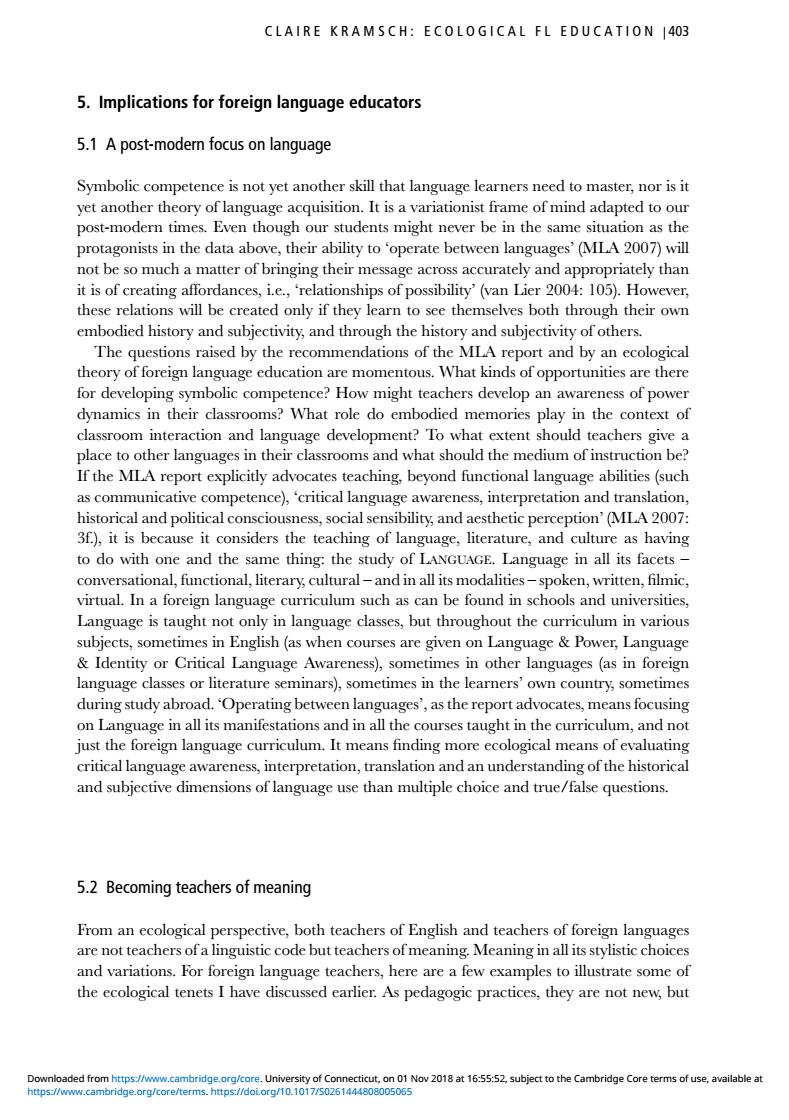正在加载图片...

CLAIRE KRAMSCH:ECOLOGICAL FL EDUCATION 403 5.Implications for foreign language educators 5.1 A post-modern focus on language Symbolic co petence is not yet another skill that lang ytanother theoty of languge acquision.Irm ofnu post-modern times.Even though our students might never be in the same situation as the protagonists in the data above,their ability to 'operate between languages'(MLA 2007)will not be so much a matter of bringing their message across accurately and ap opriately than it is of cr ating affordances.ic ,'relationships of po these s will be eated only if they see thems both through their own embodied history and story and subjectivity of others. The questions raised by the recommendations of the MLA report and by an ecological theory of foreign language education are momentous.What kinds of opportunities are there for developing symbolic competence?How might teachers develop an awareness of power dynamics in their classro oms?What role do mbodied memori olay in the cont text of assroom interaction and nguage development e To extent teachers give place to other languages in their classrooms and what should the medium of instruction be If the MLA report explicitly advocates teaching,beyond functional language abilities(such as communicative competence),'critical language awareness,interpretation and translation, historical and political c consciousness,social sensibility.and aesthetic perception'(MLA 2007: 3f)it is be ause it co siders the teaching of lan nd culture as having to do with one and the same thing:the study of LANGUAGE Language in all its fa conversational,functional,literary,cultural-and in all its modalities-spoken,written,filmic virtual.In a foreign language curriculum such as can be found in schools and universities Language is taught not only in language classes,but throughout the curriculum in various subiects,sometimes in English(as when courses are given on Language&Power,Language ldentity or Critical Language A reness) in other languages (as in foreigr nguage class es or l erature seminars),sometimes in the learners own country,sometime during study abroad.'Operating between languages',as the report advocates,means focusing on Language in all its manifestations and in all the courses taught in the curriculum,and not just the foreign language curriculum.It means finding more ecological means of evaluating critical language awareness,interpretation,translation and an understanding of the historical and subjective dimensions of language use than multiple choice and true/fals e questions 5.2 Becoming teachers of meaning Froman perspective,both teachers of English and teachers are not teachers of a linguistic code but teachers of meaning.Meaning in all its stylistic choices and variations.For foreign language teachers,here are a few examples to illustrate some of the ecological tenets I have discussed earlier.As pedagogic practices,they are not new,but CLAIRE KRAMSCH: ECOLOGICAL FL EDUCATION 403 5. Implications for foreign language educators 5.1 A post-modern focus on language Symbolic competence is not yet another skill that language learners need to master, nor is it yet another theory of language acquisition. It is a variationist frame of mind adapted to our post-modern times. Even though our students might never be in the same situation as the protagonists in the data above, their ability to ‘operate between languages’ (MLA 2007) will not be so much a matter of bringing their message across accurately and appropriately than it is of creating affordances, i.e., ‘relationships of possibility’ (van Lier 2004: 105). However, these relations will be created only if they learn to see themselves both through their own embodied history and subjectivity, and through the history and subjectivity of others. The questions raised by the recommendations of the MLA report and by an ecological theory of foreign language education are momentous. What kinds of opportunities are there for developing symbolic competence? How might teachers develop an awareness of power dynamics in their classrooms? What role do embodied memories play in the context of classroom interaction and language development? To what extent should teachers give a place to other languages in their classrooms and what should the medium of instruction be? If the MLA report explicitly advocates teaching, beyond functional language abilities (such as communicative competence), ‘critical language awareness, interpretation and translation, historical and political consciousness, social sensibility, and aesthetic perception’ (MLA 2007: 3f.), it is because it considers the teaching of language, literature, and culture as having to do with one and the same thing: the study of LANGUAGE. Language in all its facets – conversational, functional, literary, cultural – and in all its modalities – spoken, written, filmic, virtual. In a foreign language curriculum such as can be found in schools and universities, Language is taught not only in language classes, but throughout the curriculum in various subjects, sometimes in English (as when courses are given on Language & Power, Language & Identity or Critical Language Awareness), sometimes in other languages (as in foreign language classes or literature seminars), sometimes in the learners’ own country, sometimes during study abroad. ‘Operating between languages’, as the report advocates, means focusing on Language in all its manifestations and in all the courses taught in the curriculum, and not just the foreign language curriculum. It means finding more ecological means of evaluating critical language awareness, interpretation, translation and an understanding of the historical and subjective dimensions of language use than multiple choice and true/false questions. 5.2 Becoming teachers of meaning From an ecological perspective, both teachers of English and teachers of foreign languages are not teachers of a linguistic code but teachers of meaning. Meaning in all its stylistic choices and variations. For foreign language teachers, here are a few examples to illustrate some of the ecological tenets I have discussed earlier. As pedagogic practices, they are not new, but https://www.cambridge.org/core/terms. https://doi.org/10.1017/S0261444808005065 Downloaded from https://www.cambridge.org/core. University of Connecticut, on 01 Nov 2018 at 16:55:52, subject to the Cambridge Core terms of use, available at